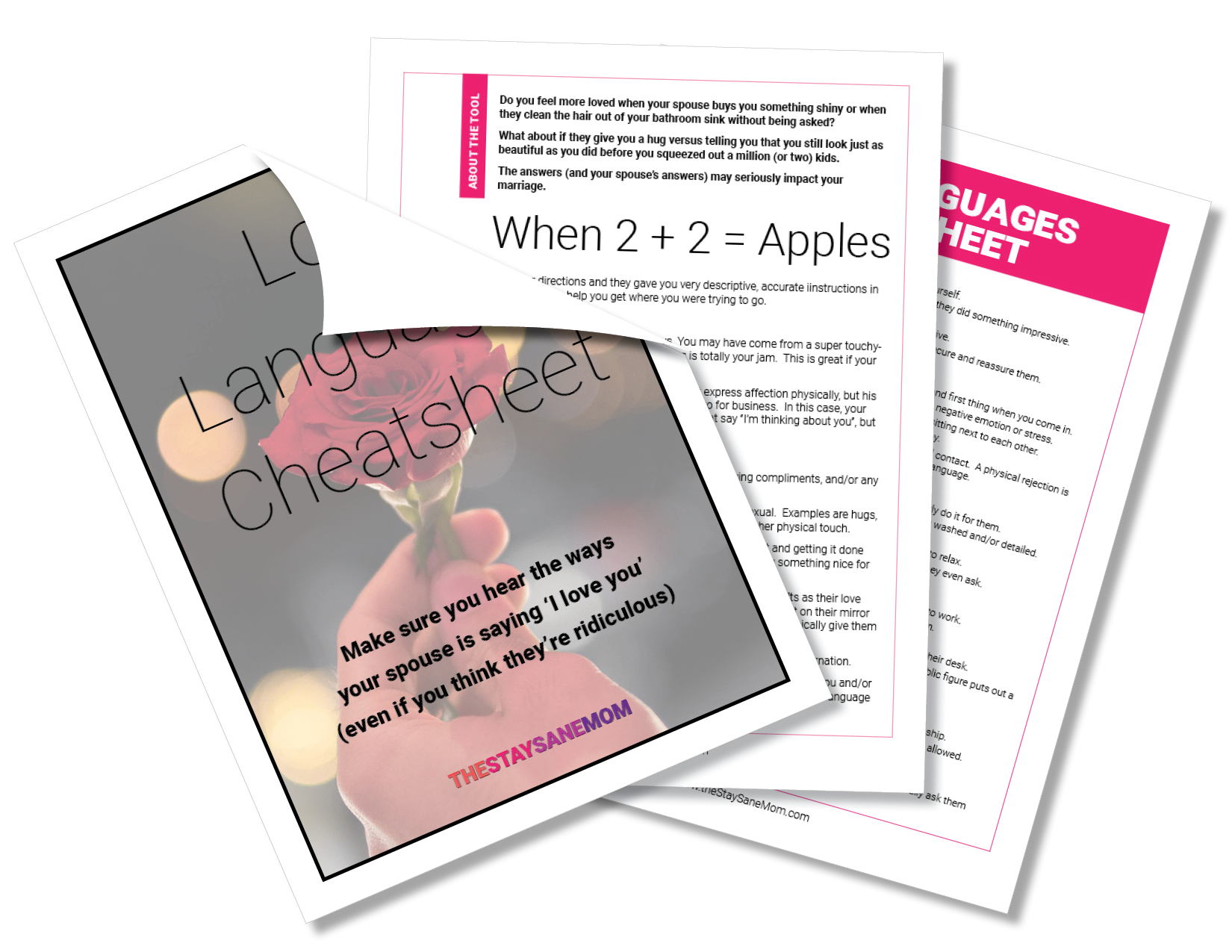The 5 Love Languages for Dummies

The 5 Love Languages for Dummies
The 5 Love Languages is one of the most popular marriage theories of recent years. Here's a beginner's guide to using your partner's "love language" and how it can better your marriage.
Written by Liz Bayardelle, PhD | See Comments | Updated 02/04/2019
Want to cut to the chase?
Love Languages Cheatsheet

Want to cut to the chase?
Love Languages Cheatsheet
Get the Free Printable Cheatsheet Now
Get it NowThe 5 Love Languages for Dummies
This post contains some affiliate links for your convenience. Click here to read my full disclosure policy.
Why is Everyone Talking About Love Languages?
The 5 Love Languages is based on a bestselling book by Gary Chapman called The 5 Love Languages: The Secret to Love that Lasts. This book has been incredibly popular among marriage therapists and regular people alike for one simple reason: it's incredibly actionable.
Lots of "marriagey" stuff takes a lot of work. It's often Herculean effort, personal sacrifice, or years in therapy.
The 5 Love Languages provides an easy-to-understand and quick-to-implement way to better your marriage without too much heavy lifting.
This might not be what everyone sees in the book, but I know it was a totally new concept for me when I read it, but after I learned about the basic premise it was one of those "oh yeah!" moments that changed the way I thought about interactions with people.
What are Love Languages?
The overall premise of the book is that people express (and receive) love in different ways.
(As you may have guessed, the author puts forth that there are 5 different "love languages" or ways to feel/express love.)
If you and your partner don't "speak" the same love language, you might both be incredibly devoted and committed to each other, but still feel unloved because you're expressing it in different ways.
For example, if your "love language" is words of affirmation, but your spouse "speaks" physical touch (these are two of the love languages), you will express your love by complimenting them and saying nice things. However, all they really want is a hug, so your compliments go in one ear and out the other. Similarly, they express their love by holding your hand or giving you a pat on the shoulder as they walk by you, but all you want is to hear them say how proud they are of you.
That's why the love languages concept has gotten so much attention. It brings to light the idea that couples with seemingly huge marital issues could be misinterpreting (or outright missing) each others' signals and expressions of love.
Once you learn to "speak" your partner's love language, you two will get on the same metaphorical page and realize how much you both actually loved each other all along.
So What are the 5 "Love Languages"?
The five love languages are words of affirmation, physical touch, gifts, acts of service, and quality time.
In this post, I'll go over the basics of each love language as well as what to do if you or your partner "speaks" that love language as their primary love language. (Yes, you can have more than one. Most people do, but there's usually one or two that's the most salient.)
Finally, I'll attach a free, downloadable cheat sheet with ideas of how to use each language in your day-to-day marital interactions. Think of it like preparing for a trip to France by printing out a pocket phrase book with the most commonly-used French phrases. It won't get you fluent, but you won't accidentally ask your waiter 'which lawnmower flies the cheesiest'.
Now we'll go over the five different love languages, one at a time...
#1: Words of Affirmation
This one is the most stereotypical of the love languages. I don't mean bad, I mean it's what most people picture when they think of expressing love.
People who "speak" words of affirmation as their love language are great at telling their partner how amazing they are, how much they mean to them, and all those yummy rom-com lines that make us swoon in the movies. In exchange, they want to hear their partner say similar things to them in order to feel loved.
This might not be literally saying the words "I love you" a million times a day. It could be wanting to hear that your partner respects you, that they think you're doing a good job, that they think you're still attractive, or any other verbal affirmation.
If this is your love language, you're not alone. This is a very common love language for both sexes. Wanting verbal reassurance of your spouse's affections is perfectly normal.
If you don't feel like you're receiving the reassurance you need, it might be time for some marital TLC. If you want some help either speaking this love language (if it's your spouse's primary love language) or if you want to help your spouse "speak" it better (if it's yours) check out my post on how to keep the romance alive when the honeymoon ends.
It focuses on how to make sure you keep the positive affirmations in your marriage, even when kids, life, jobs, and whatever else get in the way.
#2: Physical Touch
While many people think this love language refers to physical intimacy of the...erm...bedroom variety, it's actually describing all the innocent hugs, pats, kisses, and touches that happen (usually without thought) throughout the course of an average day.
Along with words of affirmation, physical touch is one of my primary love languages. After a long process of trying to explain it to my spouse, I told him to just treat me like your average labrador: pat me and tell me I'm a good girl and I'll follow you anywhere.
A demeaning metaphor (I've been told), but that doesn't make it any less true. The little gestures like a longer-than-a-peck kiss before he leaves for work, a hand on the small of my back as we walk in a doorway, or little pats as we pass each other in the house make an incredible difference in my mood, happiness, and feeling of confidence in our marriage.
This Sounds Like Me
If this is your love language, you might need to communicate it to your spouse. I've seen cases where one partner has physical touch as one of their love languages and the other doesn't. The one who does can't understand why it's not intuitive for their partner to make these small physical connections, but the other spouse is completely blindsided when the first partner mentions it.
Don't assume your partner knows this is one of your needs unless you've actually had the conversation.
This Sounds Like My Spouse
If this is your spouse's love language, again, you might not already know it. (Read: ask.) If you do know that this is one of the main ways your spouse chooses
#3: Gifts
Just like the physical touch love language is often misconstrued to be about sex, the love language of gifts is often mistakenly thought to be about materialism. This isn't the case at all.
When someone has gifts as one of their love languages, it doesn't mean they need expensive presents all the time; it means they like having a physical reminder of their partner's affections.
This could just as easily be a $2 keychain from the theme park where they had their first date as it could be a Tiffany bracelet. What matters to someone who "speaks" the love language of gifts, is that they have something they can hold in their hand that reminds them that their partner was thinking of them.
This Sounds Like Me
If this is your love language, make sure your spouse knows that it's your preference, but that it's not all about the price tag. Positively reinforce things you like so they know when their attempts at showing you love have been received.
However, do also be honest when they miss the mark. If your husband of one year buys you a gold bracelet when you only wear silver and hate calling attention to your chubby wrists, for heaven's sake say something! If you don't risk hurting his feelings in the short term, by your 35th wedding anniversary you're going to have a jewelry box full of gold bracelets you absolutely hate.
Instead, try highlighting when they do something you like.
This Sounds Like My Spouse
One of my favorite "gifts" my husband ever gave me was, when I had a hard day at work, I came home to find our apartment covered with sticky notes that said "I love you". It probably only took him 10 minutes to do, and a pack of post it notes costs a maximum of $0.60, but I saved every last one of them and --two relocations later-- I still have them proudly displayed in my closet, desk, and my side of our bedroom.
Gifts don't have to be expensive, but they do have to be heartfelt.
If this is your spouse's primary love language, try thinking of little things you can get them. This could be stuff like little love notes or cards snuck in their suitcase when they go out of town, a favorite candy of theirs left on their desk in your home office, a fridge stocked full of their favorite soda brand. It really doesn't have to be hearts, flowers, and jewelry every day, but finding little things your spouse likes and surprising them with it can mean the world to a person with gifts as their love language.
#4: Acts of Service
The basic premise here is that if you have "acts of service" as one of your primary love languages, you feel loved, valued, and taken care of when your partner takes on some of the tasks currently on your plate.
This is common for many women who serve as the primary caregiver to our horde of children, are in charge of keeping the house in order, and then have the audacity to want a life/job/purpose outside of that. This is because, as you well know, we could clone ourselves four times and still not get everything done in a day.
I'm sure you've all seen about eight billion Pinterest/Facebook/webbernet memes about this one.

Yeah, it's a thing.
This Sounds Like Me
If this is your love language but NOT your spouse's, you probably grumble a lot. You might even know about the phrase "rage cleaning". (You might have considered getting it as a tattoo.) If any of this is sounding familiar, you might have to communicate to your spouse that this is how you receive love.
Now, just to be clear, when I say "communicate", I do not mean "nag". Here's a good example and a bad one:
DON'T COMMUNICATE LIKE THIS: "Why do you never help me out? I'm the only one who lifts a finger around here. Don't you get that the stupid love languages thing said that you'd take the trash out if you loved me?"
DO COMMUNICATE LIKE THIS: "Honey, I'm exhausted. It would mean more to me than five bouquets of roses if you took the trash out so I could finish these meeting notes before I have to bathe the kids."
This is letting them know that they are expressing love for you by doing something, and it doesn't sound "blame-y" (and therefore hopefully won't trigger any defensiveness or latent arguments that might have been previously had about said garbage).
This Sounds Like My Spouse
If this is your spouse's love language but NOT yours, you might not even know it.
This was totally me for the first few years of my relationship with my now-husband. As I mentioned, my primary love languages are words of affirmation and physical touch (again, Labrador). I actually am annoyingly attached to most of the tasks I do. I love being a mom, I adore every second of my work time, and I crave doing my research and schoolwork. In fact, I get quite crabby if someone tries to take stuff off my plate. (Sorry, honey.)
For this reason, I actually didn't realize this was one of my spouse's primary love languages until embarrassingly late in the game. He loves it when I cut up fresh fruit and bring it in while he's working, when I surprise him and refold all the messily folded clothes in his closet, or vacuum his garage/office so he doesn't have to do it.
Until I actually read the book, I didn't take the time to reflect back and say "oh yeah, I can totally see how that probably is how he feels most loved".
If you think this might be your spouse, try doing different things to see which tasks they are happiest not to have to do. It might not be everything. Like in my case, if you try to take "lunch with the kids" off my to do list, you'll actually be making me sadder because it's something I really enjoy doing. However, if you offer to take my car to the mechanic, you'll be my hero for life because I genuinely hate doing that. (Hubby does, by the way.)
Do some experimenting, see what makes your spouse the happiest, and (for goodness' sake) don't hesitate to ask. Simply saying "what can I do to make your day easier today?" can make a huge impact on a spouse that speaks "acts of service" as their primary love language.
#5: Quality Time
When I first read about this one, it felt like quality time was the most "duh" of the love languages. It makes sense that, in order to maintain a happy relationship, you need to spend time with your spouse, right?
However, as I read more about this, I found out that there are a lot of quality time killers that sneak into most of our marriages. (Yes, one of the big ones is called "kids".)
There is a huge difference between "time together" and "quality time together", which is what makes this love language so important.
Especially in the modern age of technology, dual-career families, overdosing kids with extracurriculars, and all the other crazy busy interferences with actually enjoying life, there are a lot of things that get in the way with spending honest-to-goodness quality time together. Yes, you have dinner together, but you're all watching TV anyway. Yes, you're in bed next to each other, but you're checking email and he's playing freecell on his iPhone.
The quality time described here is time that you just spend together. No multitasking. If you're going for a walk together, that's all you're doing. No music, no work calls. If you're playing darts together, you're just playing darts. No texting, no helping the kids with homework.
If you separate out all the "time" you spend together and focus on just the "quality time" you spend as a couple, you'll probably be surprised by how little of it there actually is in your day-to-day grind.
This Sounds Like Me
If this is your love language, you probably feel like you miss your spouse, even when you seemingly spend a lot of time together. If this isn't their love language, they might really not understand it when you say that you miss them.
"We just spent all day together! How do you miss me? *confused basset hound face*
You're not alone. It's hard to describe the desire for more quality time when your partner "speaks" a different love language.
My best advice is to suggest specific activities to do together. Instead of asking your partner for more attention or more time (which is usually taken as "you're not doing enough"), try asking for a specific thing. If you're both sporty, you can ask to go on a run together. If you're foodies suggest a no-phones-no-kids dinner at a new restaurant in town.
By asking for something specific, you're not demanding that they "speak" a love language that doesn't come naturally, but you're still getting your needs met.
This Sounds Like My Spouse
If this is your spouse's love language, they may have reached out to you about doing more together or they could be the 'suffer in silence' type. However, once you know that this is one of their primary love languages, you can increase your "quality time" in two ways.
First, you can always work on being as present as possible when the two of you are normally together. Put the phone down. Stop going over your to do list in your head. Ignore the kids. (Just kidding on that last one. Please make sure those little terrors don't burn the house down. Other than that ignore them.)
If you need help with what to do when you're not multitasking, try the free printable list of questions to ask your spouse included on my blog on continuing to get to know your spouse. If all else fails, just look them in the eye, ask them about their day, and then actually listen to the answer. You'll be shocked at how much of a difference it makes.
The second way to give your spouse more quality time is by actually planning activities. This may be like pulling teeth for couples that are uber busy, but do it anyway. It doesn't have to mean giving the kids to Goodwill...I mean their grandparents for an entire weekend. Try putting them all to bed and going on a mini date night on your sofa. Bring home the fixings for homemade nachos, leave your work computer on the charger, and actually watch a football game together. Whatever the two of you enjoy doing, make a point of doing it together with no distractions.
Your Free Cheatsheet
So I promised at the beginning of the post that I'd help you out. Since this is a "for dummies" post, I thought I'd pilfur another staple of academic slackerdom and give you a "sparknotes" type of reference sheet.
However, this doesn't go into crazy depth to summarize the 5 Love Languages. (We kinda just did that.)
What it does do is give you a huge list of ways to "speak" each of the 5 love languages. This is in case, like me, you ended up with someone whose natural love language is different from your own.
Grab the free PDF, print it out, and give different items a go. You'll know from your spouse's reaction exactly when you hit on the one(s) that are a direct match with the way they receive love. From there, you can fine tune until you have the happiest marriage in the land.
Leave a comment for what surprises you most as you go through it!
Start Your Next Step
Love Languages Cheatsheet

Get Sanity, Delivered to Your Inbox.
Care to Share?




About the Author

Liz Bayardelle, PhD
Founder | Contributor
Liz (or Dr. Mommy, as her toddler started calling her after learning what a PhD was) is the happily sleep-deprived mom of a toddler (and professional raccoon noise impersonator), a sparkle-clad kidnado, a teenage stepdaughter, 200 cumulative pounds of dog, and herd of dustbunnies (if daily vacuuming doesn't occur). During nights and naptimes, she uses her PhD in business psychology as an author, speaker, and consultant. She also serves as an executive and principal for three companies, two of which she co-founded with her very patient (and equally exhausted) husband.





